Dignity and respect are the key to a multimillion-dollar ministry supported by a successful thrift shop
During the COVID-19 closures of 2020 and 2021, the leaders of Dorcas Ministries decided to remodel their popular thrift shop to look and feel like a T.J. Maxx, the off-price retailer with discounted items from name-brand fashion to home decor.
The shop, located in a former grocery store in Cary, North Carolina, was already a treasure trove for bargain buyers. The new look made it even more enticing.
The Dorcas Thrift Shop space is mostly taken up with lightly used clothing, rack upon rack, neatly organized by type. At one end of the cavernous building are multiple shoe shelves arranged by size. Handbags, belts and scarves line a wall.
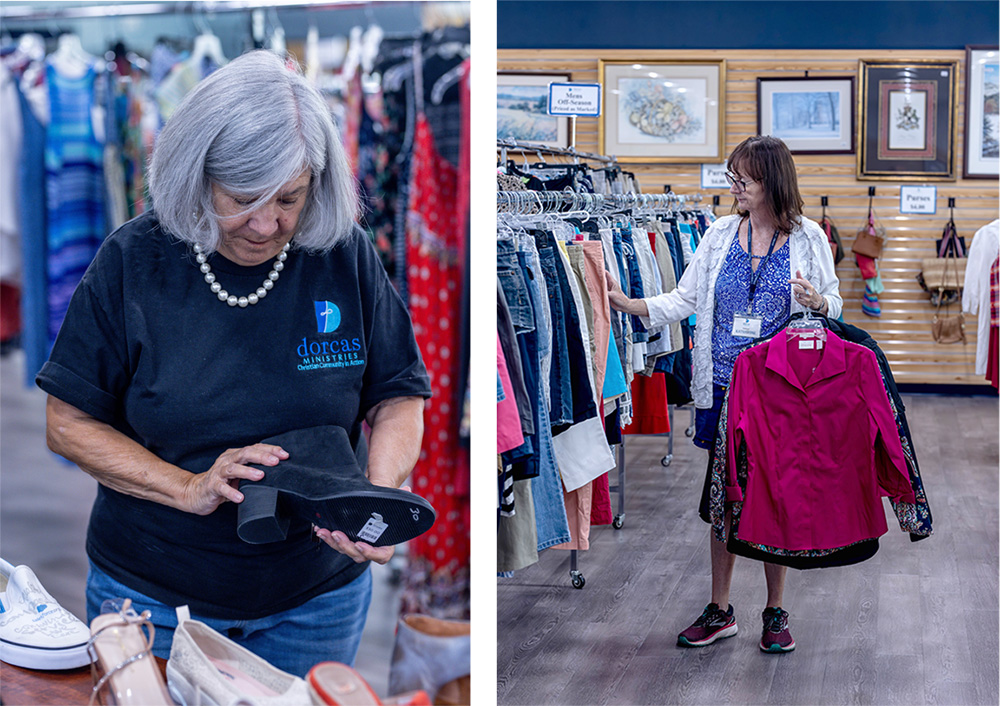
Closer to the checkout points are seasonal items — right now, Halloween costumes — and farther down, toward the rear of the store, shelves stocked high with housewares. In between, glass cases sparkle with vintage jewelry.
Customers flock to the shop from all over Wake County and the surrounding region. After browsing with shopping carts or tote bins, they pay in cash or with credit or debit cards.
The average cost of an item? $2.50.
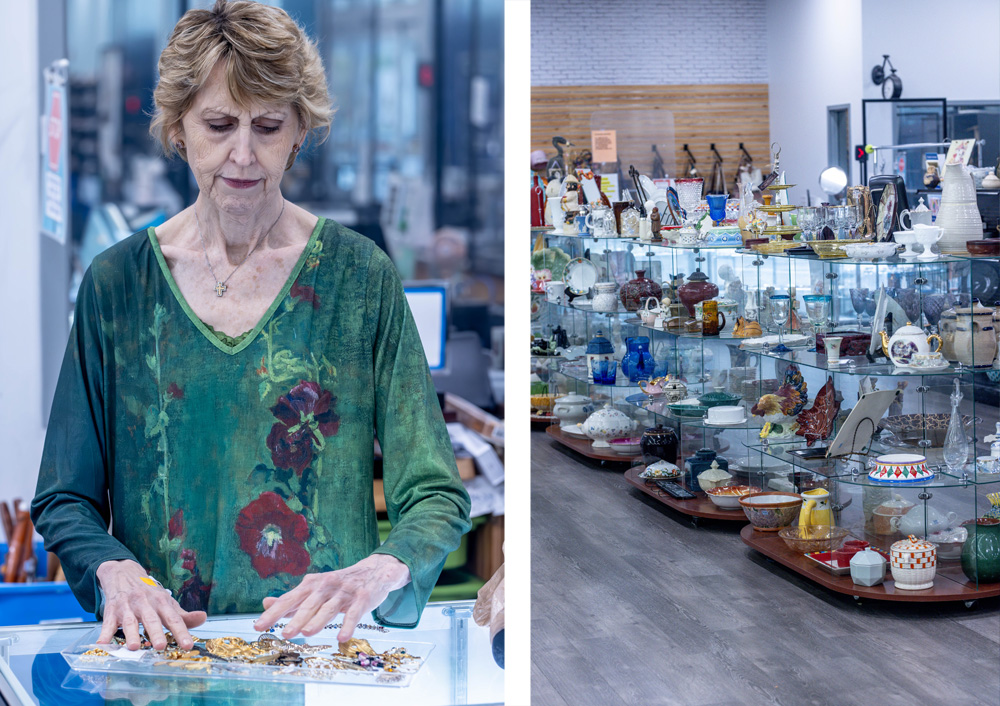
There’s a reason the thrift shop, which anchors a plaza owned entirely by Dorcas, tries to model its services on professional business practices.
The ministry sees that as a way of treating people of all income levels fairly and eliminating barriers to social mobility.
“Our job is to treat everyone like God’s children, with the compassion, dignity and respect they deserve,” said André Anthony, the ministry’s CEO. “That’s our primary focus.”
Volunteers help neighbors thrive
That formula appeals not only to low-income shoppers but also to a healthy corps of middle-class volunteers from Cary and Morrisville, affluent suburbs of North Carolina’s capital of Raleigh, who have helped make the ministry a success.
The ministry takes pride in having earned Top 10 ratings in the “Best Thrift Shops” category on Yelp, the crowd-sourced review platform. On a typical weekday morning, several dozen people wait outside the shop ready to make their way in as soon as the doors open at 11 a.m.
Started 55 years ago by a group of women from nearby churches, the ministry takes its name from the seamstress Dorcas, mentioned in the book of Acts as “always doing good and helping the poor” (Acts 9:36 NIV).
Last year, the shop generated $3.2 million in sales. It used that income to provide $2.2 million in financial assistance to the area’s poor, becoming a premier social welfare agency for a region of more than 200,000 people.
Dorcas employs 27 full-time staff, but it relies on 600 dedicated volunteers, without whom it could not fulfill its mission of “helping neighbors thrive.” Its volunteers, many retired from careers as IT specialists, corporate executives and health care professionals, are eager to give back to their community.
What compelling vision does your organization use to inspire volunteers?
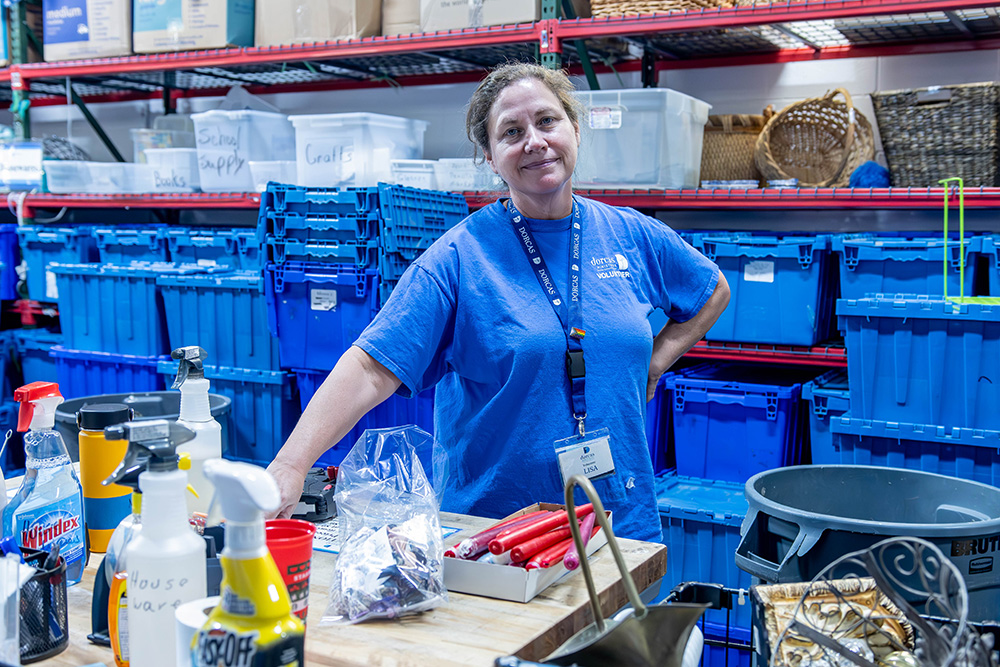
Some 500 of those volunteers take one or two weekly three-hour shifts sorting, cleaning, fixing, pricing and labeling the avalanche of donations that accumulates daily at the shop’s rear dock.
Impressive as it is, the thrift shop is just the foundation of a vast set of services that Dorcas offers with income from the store. That’s where about 100 additional volunteers with experience working with people in difficult life circumstances apply their talents.
In 2022, Dorcas helped 2,000 families (or about 5,800 individuals) with emergency financial aid and other services at its crisis center located in offices next to the thrift shop. Those helped are typically low-wage workers living paycheck to paycheck who, because of divorce, illness, the birth of a child and/or lack of paid parental leave, fall behind on their rent or are facing eviction.
“Dorcas is probably the most significant social ministry in our area in terms of how many people they serve and the kind of services they provide,” said the Rev. Wolfgang Herz-Lane, the senior pastor of Christ the King Lutheran Church in Cary, one of 40 area congregations that regularly donate financially to the ministry.
Christ the King provides Dorcas with a steady stream of volunteers and refers people in need. So much so, Herz-Lane said, that he thinks of it as a “social ministry arm of our congregation.”
Helping people in crisis
Like the thrift shop, the Dorcas crisis center is modeled on an ethic of respect and dignity for all. A receptionist greets people and directs them to private rooms where they meet with case workers to assess their needs and come up with plans to address their financial difficulties.
How do you communicate your vision and invite potential volunteers to be part of it?

Clients at the crisis center receive checks — usually within 48 hours — to help pay for rent or utilities. Dorcas may even help pay for veterinary care (addressing the No. 1 reason pets wind up in shelters — families’ inability to pay veterinary bills).
But the aid doesn’t stop there. Clients receive ongoing counseling and other services for a period of three months to a year. That may include one-on-one career coaching, cash stipends for those willing to enroll in workforce training classes at the local community college, or preschool scholarships for children.
“We don’t just hand them a check for rent assistance; we hand them a check and say, ‘OK, let’s talk through some changes that can be made,’” said Sally Goettel, a former Dorcas board member who continues to volunteer there. “By getting that holistic approach, it’s just so much more effective.”

At the crisis center, clients can also take advantage of a mobile University of North Carolina nursing clinic that provides free basic preventive care, including school physicals, every Tuesday morning and twice a month on Saturdays.
But the most basic form of support the ministry provides is food.
Food assistance for families in need
Similar to the T.J. Maxx-inspired thrift shop, the Dorcas food pantry, located a few doors away, is modeled on a high-end food store. Dorcas clients can take a cart and browse a wide selection of prepared foods as well as fresh fruits and vegetables, dairy items, baked goods, paper goods, diapers and even cat food. Grocery shelves are labeled in English and Spanish. Recently, the pantry started a Taco Tuesday meal kit. (About 8% of Cary residents are Hispanic.)
Here, too, the idea is to treat people with respect — not just to give them a handout. While anyone can shop at the Dorcas thrift shop, the pantry is reserved for families in need who have gone through its client services intake.
“It’s not a preselected bag of food,” Anthony said. “It’s very much client choice. It’s intentionally set up where, when you walk in, you feel just like anybody going to a grocery store.”
If you have an idea for Christian social entrepreneurship, could it be supported with an active volunteer base?
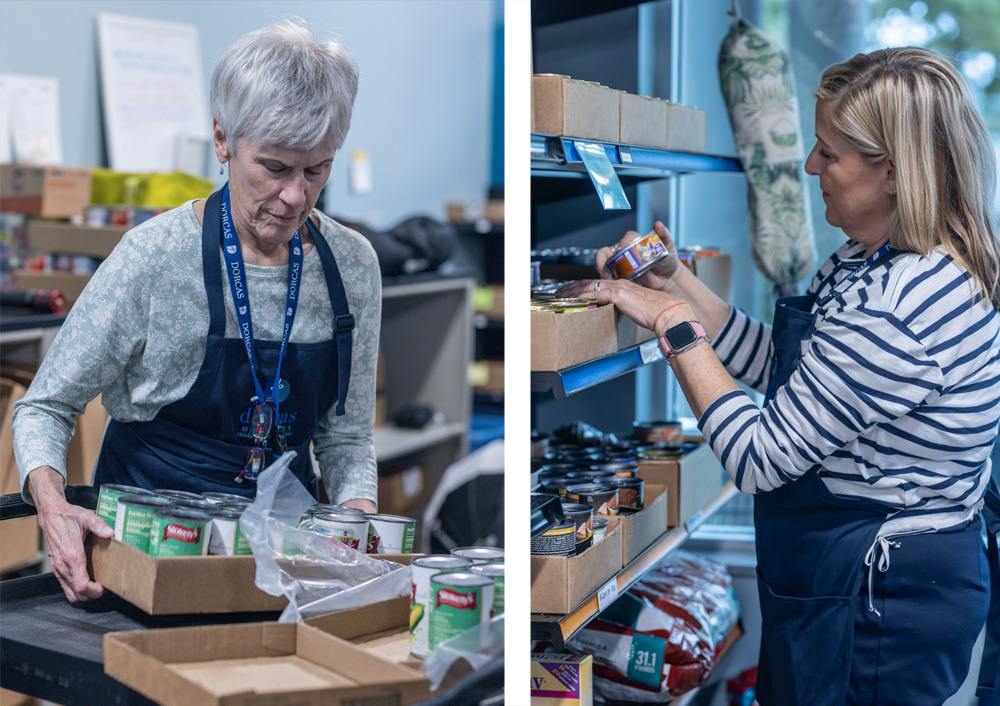
Sallie Whelan, a retired schoolteacher, said it’s the interaction with clients that makes the food pantry such a satisfying volunteer experience.
“I wanted to do something in my retirement that would go towards my philosophy of helping people,” said Whelan, 67. “We’re working directly with the people that are shopping — helping them find something that they’re looking for or explaining the process to them.”
Founded on faith and dignity
While the ministry is motivated by the Christian faith of its founders, the employees and volunteers do not ask clients about their faith and only mention its Christian roots if asked. Among the 40 congregations supporting Dorcas, one is a synagogue; another, a Hindu temple.
“Whether they’re Christian or whether they’re Hindu or whether they’re purple or whether they’re green, if you want assistance and you live within the geographic region that Dorcas supports, they can assist you along a path,” said Barbara Bostian, 66, who volunteers as a career coach and serves as vice chair of the ministry’s board of directors.
That desire to help neighbors is how Dorcas got its start. In 1968, a group of mostly white women from Cary’s downtown churches that had been meeting for a Bible study decided to add a service project.
Southern schools were still segregated in those days, and the women decided to form a class for Black children who didn’t have access to kindergarten.
They drove through town, stopping at homes where they spotted a clothesline with children’s clothes or toys on the front lawn. About 40 children eventually enrolled and met at a local predominantly Black church.
Thus was born Christian Community in Action, still Dorcas’ legal name.
How does your faith community offer support while maintaining the respect and dignity of its neighbors and clients?

Soon after the program began, people started donating clothes for the children, and a small clothing closet was set up. To help preserve people’s dignity, CCA began charging people a nickel or a dime for each item. This was the start of the Dorcas Thrift Shop.
“They started putting money in a jar,” said Jill Straight, Dorcas’ senior director of client services and advocacy. “And then when one of the families they were working with needed help with a light bill or water bill, they used the jar of money to help with the bill.”
By 1972, the thrift shop transitioned from a church closet to a downtown apartment. The kindergarten program ended in 1980, but the thrift shop continued to grow.
After moving half a dozen times, the ministry bought an old strip mall in 2008 and invested more than $4.5 million in building upgrades. It rented out adjacent spaces to other nonprofits, including a Habitat for Humanity ReStore, an after-school literacy program and a behavioral health care management group.
Dorcas Plaza also includes a few for-profit businesses — one of which, a pool hall, has been a good neighbor to the ministry, contributing money through fundraising drives.
These sound business decisions have helped the ministry boost its volunteer roster. Each week, a Dorcas staff member conducts an orientation tour for potential volunteers. On a recent Tuesday, those included a handful of retirees and a young man with developmental disabilities.
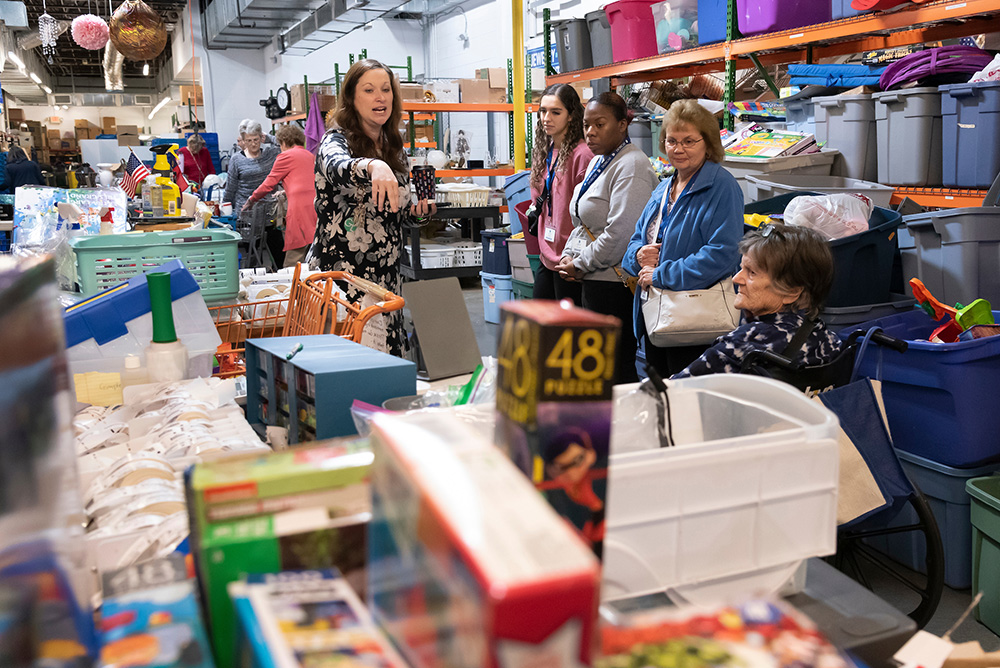
Shelley Hobbs, Dorcas’ director of marketing, gave the group a behind-the-scenes tour of the thrift shop, the food pantry and the crisis center.
All were familiar with the Dorcas Thrift Shop, and several said they had shopped there for years. One of them, Carolyn Jungclas, had recently retired from a career as head of procurement for First Citizens Bank.
Jungclas, 60, described herself as a crafter who loves to sew. She wanted to volunteer to sort through the linens and fabrics the thrift shop receives. A friend had told her that Dorcas could use her help.
“I’m a firm believer, from the Gospel of Luke, that to whom much is given, much is expected,” Jungclas said.
But what impressed her most was the ministry’s emphasis on treating people with dignity.
“To me, that just is so key,” Jungclas said. “I’m hoping to start as soon as possible.”
How do your volunteers describe the work of your organization? How do they describe working for your organization?
Questions to consider
- What compelling vision does your organization use to inspire volunteers?
- How do you communicate that vision and invite potential volunteers to be part of it?
- If you have an idea for Christian social entrepreneurship, could it be supported with an active volunteer base?
- How does your faith community offer support while maintaining the respect and dignity of its neighbors and clients?
- How do your volunteers describe the work of your organization? How do they describe working for your organization?
In their long friendship, economist Laura Ullrich and pastor David Brown have talked a lot.
“We like to meet for coffee and talk about deep things that other people may not find as exciting as we do,” Ullrich said.
Ullrich, who is the senior regional economist for North and South Carolina for the Federal Reserve Bank of Richmond, met Brown when she moved to Rock Hill, South Carolina, and he was the pastor of the church she attended.
Brown worked as a pastor for two decades before becoming a consultant and coach as well as a registered representative with New York Life. He also is the founding pastor of a community of disciples in Rock Hill called The Welcome Table.
So when Brown began teaching in the D.Min. program at Duke Divinity School, he invited Ullrich to come to his strategy class to talk about economics.
Ullrich talked about trends and data; Brown put the information in context as a pastor.
Following that model, Ullrich and Brown share their thoughts on economics, ministry and Christian life in this interview with Faith & Leadership’s Sally Hicks. The following is an edited transcript.
Faith & Leadership: Why do you think pastors should understand economics?
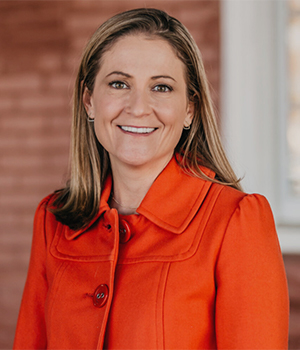
Laura Ullrich: I would argue that economics can explain just about anything, because it explains how people and firms and organizations — which could also be a church — make decisions in the presence of scarcity. Scarcity of resources, scarcity of time.
How are people making their decisions [about] where they attend church, whether they attend church, how often they attend church? When they’re making decisions about how to allocate their time, that’s economics.
Another issue is the racial wealth gap. I personally think this is an important topic for everybody to understand — that some of the structural foundations of the economy since the founding of the United States prevent some families from growing the same kind of wealth that other families have.
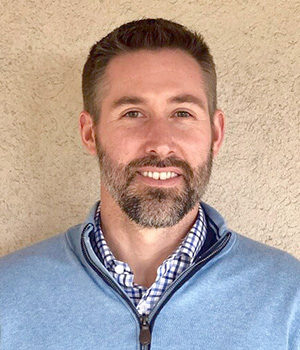
David Brown: I would add to that, I think that theology can be a lens through which a lot of how we experience things can be understood.
The sort of economics that Laura deals in from day to day is built on that idea of scarce resources. From a Christian point of view, we worship and follow a Jesus who was inaugurated in a kingdom where the bottom line was abundance.
It’s not an economy, perhaps, that we will experience on this planet. But our calling as Christians is to move our lived experience in this world toward that ideal.
That interplay between the scarcity that we actually experience in our economy versus this vision of what human flourishing might be — I think that’s the tension in which we live as followers of Jesus.
F&L: How can pastors or congregants or Christian individuals use this information?
DB: I would say that for those of us who are Christians, and Christian leaders, it’s a spiritual crisis as well. How do we respond faithfully to the volatility that’s going on around us?
What do we actually learn from in times of volatility? Can we sense new directions of God’s spirit that are moving us into new ways of being through disruptions? Are disruptions actually a learning opportunity for us?
Moving into the future, all leaders are going to have to intentionally increase their capacity to deal with change, uncertainty, volatility.
I think the other way to come at it is through the best of our tradition and heritage and history. How can we not be paying attention to economics and the situation in which our neighbors are living?
I think Jesus talks more about money than just about anything. The law and the prophets really talk about how we order society to lead toward human flourishing.
Our goal, our telos, our end goal in Christian leadership, what sets us apart from other types of firms or businesses or other types of leaders, is that we’re framed by the beginning and the ending of the biblical story.
We’re framed by the goodness of God’s creation in the beginning, and we’re framed by the re-creation we believe is in process and will come to completion one day.
F&L: What would you like people to understand about economics?
LU: I think that leaders of churches have a responsibility to try to make people aware of what the world looks like outside the walls of their particular churches, because even on the same street, it can be very different. And data can help with that.
A big part of my job is educating people about what’s actually going on. It’s really easy to get tunnel vision. If you live in a community with people, including in your church life, that look very much like you, have income levels that are about where yours are, you really can be in a place where you do not realize what the data actually show.
Has the wage gap between men and women or Black individuals and white individuals narrowed? Yes. But what are the data around what’s actually going on in terms of wealth?
The most recent data show that Black families are 20 times more likely to have zero or negative wealth than they are to have a million dollars in assets. That comes from the Institute for Policy Studies.
So a church that relies on white membership might have a pretty constant stream of money from people leaving money to them in their wills and things like that. They’re also getting regular large gifts from people as they start giving away assets as they get older.
A church with predominantly Black membership may struggle from a financial point of view in a way that’s likely different from a white church simply because of that statistic.
On the behavioral economics side, there are things that leaders within churches can do to encourage tithing or increase tithing. There are ways that they can practically impact the financial viability of their churches by thinking through how people make decisions.
What engages people at a deeper level than they might be giving otherwise?
So I think there’s a practical side of it, too, just from actually funding your organization. I’m sure it’s something pastors don’t feel as comfortable talking about, but it’s a very important part of running a church.
DB: I think No. 1 is the ability to look up from trying to preserve our institution and to see what God is up to in the world around us. And to believe that the Spirit is already at work, that God is already on a mission in the world outside the institutions of our churches.
Listening, asking questions, really assuming that we have something we can learn from our neighbors who are similar to us in some ways and different from us in other ways.
Take an asset-based approach to our neighborhoods, and to our ministry alongside our neighbors. Instead of focusing on problems we might solve — especially white, resourced churches — really look at what assets are in the neighborhoods around us. How can we invest out of our resources in those assets?
And when we share those things that we have with one another, and when we build on the assets that God’s planted in the community, that’s really where this vision of God’s kingdom begins to take root and bloom.
F&L: Does a policy focus make sense, or do you see other ways to effect change?
LU: Churches and all organizations have to be careful with policy, because you don’t want it to be overly political.
But there are certain policies that really aren’t political in nature. There are some policies where it’s pretty clear that if there were relatively small changes, it could have a big impact.
An example was the GI Bill. When the GI Bill was passed, years ago, on paper it looked like it was this amazing opportunity for all veterans.
But then when you actually dug in, there was a major push in the South, specifically, in Congress and the Senate, to get the GI Bill to be locally administered versus federally administered. And the impact of that ended up being pretty significant discrimination at the local level.
And so the reality was the GI Bill could help you buy a house as a veteran, but those opportunities were not equal across race and gender. Redlining was in place with banks, so you couldn’t get a mortgage in a lot of the predominantly minority neighborhoods. And in the South, many of the white neighborhoods had covenants that said minorities couldn’t live there.
So the practical application of this local policy, the fact that it was locally administered, resulted in some pretty significant discrimination.
So that’s an example of a policy where decisions that were made led to generational outcome differences. At the time, if people had been more aware of how these decisions were made, maybe something could have been different, right?
DB: There’s a good bit of variance across denominations in this area. There may be specific ways in which denominational structures either encourage or discourage that.
You can hardly read Scripture and not be called to act for, not just the common good, but the flourishing of all people. So I think our faith requires us to be political but not partisan.
I think there are two things that are helpful here. One of them is oriented toward the past; one of them is oriented toward the future.
Oriented toward the past, I think that particularly white Christians and churches who have been a part of the power system in the United States can acknowledge and repent. And repentance isn’t just something you say; it’s something you do.
And then the forward-looking piece: I’m teaching strategy, where the rubber hits the road for ministry. There’s this interplay between theology and economics and Christian practice.
One of the ways we define strategy in the class is “what we are doing in the present.” Everyone has a strategy; how well thought out, how intentional it is, is the question.
I think that to be more intentional about that would be to say, “Who is it that we are as churches? What are we called to do? What is God’s intention for us? And how are we living into that?”
I think that’s more than just, “How do we keep the lights on in the church building or pay down the mortgage or increase our budget?”
F&L: What is your advice for folks struggling with whether there is going to be a recession?
LU: There are a lot of people that were literally taught in school that the definition of recession is two quarters of negative GDP growth. That’s not true. There’s no true definition of a recession. However, because so many people believe that definition, that changes how they make decisions, right?
I think people are right to feel unsettled right now. We have the highest inflation we’ve had in 40-plus years. The last time inflation was this high, David and I were in preschool.
And for a large percentage of the population, this is truly causing them stress. It is difficult for them to maintain their lifestyle right now compared with how it was six months or a year ago. So the discomfort is understandable and real.
On the more positive side, for most of us, the only recessions we remember well are the COVID recession, which was a bizarre situation, and then the Great Recession, which is called the Great Recession because it was so significant.
A lot of people who are working today don’t remember the recession in 2001, or in 1992, 1993. They were recessions but were not as significant. So when a lot of people hear “recession,” they think of something more extreme than it might be in the end.
As of right now, employment remains very strong. We are adding an impressive number of jobs in the U.S. each month. Until that pattern changes, it is less likely that we will officially be in a recession.
F&L: David, what do you think church leaders should do in this period of uncertainty?
DB: Pastors and other church leaders have to intentionally cultivate a sense of hopeful realism.
As pastors, part of our calling is to be companions and shepherds of our congregations as we move through life together. You can’t do that with either a Pollyannaish sense of optimism or a sense of cynicism.
The place that I would start is with a core belief statement, that the God that we believe in is a God who has guided God’s people through all sorts of times of uncertainty and challenge. God invites us to be active participants in that story of ongoing redemption. God’s grace and love will sustain us no matter what.
Even in the midst of all that’s going on, and the real actual pain and uncertainty, God is still present in the lives of God’s people. And so we can find reasons for hope.
When we share those things that we have with one another, and when we build on the assets that God’s planted in the community, that’s really where this vision of God’s kingdom begins to take root and bloom.